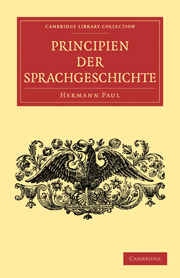Book contents
- Frontmatter
- Contents
- Cap. I Einleitung
- Cap. II Allgemeines über das wesen der sprachentwickelung
- Cap. III Der lautwandel
- Cap. IV Bildung der auf die sprache bezüglichen vorstellungsgruppen und wirksamkeit dieser gruppen
- Cap. V Zerstörung und verwirrung der gruppen durch laut- und bedeutungswandel
- Cap. VI Reaction gegen die zerstörung und verwirrung der gruppen
- Cap. VII Bedeutungsdifferenzierung
- Cap. VIII Verschiebungen in der gruppierung der etymologisch zusammenhängender wörter
- Cap. IX Der positive wert der isolierung
- Cap. X Urschöpfung
- Cap. XI Die scheidung der redeteile
- Cap. XII Die spaltung in dialecte
- Cap. XIII Sprache und schrift
- Cap. XIV Die gemeinsprache
Cap. XI - Die scheidung der redeteile
Published online by Cambridge University Press: 29 August 2010
- Frontmatter
- Contents
- Cap. I Einleitung
- Cap. II Allgemeines über das wesen der sprachentwickelung
- Cap. III Der lautwandel
- Cap. IV Bildung der auf die sprache bezüglichen vorstellungsgruppen und wirksamkeit dieser gruppen
- Cap. V Zerstörung und verwirrung der gruppen durch laut- und bedeutungswandel
- Cap. VI Reaction gegen die zerstörung und verwirrung der gruppen
- Cap. VII Bedeutungsdifferenzierung
- Cap. VIII Verschiebungen in der gruppierung der etymologisch zusammenhängender wörter
- Cap. IX Der positive wert der isolierung
- Cap. X Urschöpfung
- Cap. XI Die scheidung der redeteile
- Cap. XII Die spaltung in dialecte
- Cap. XIII Sprache und schrift
- Cap. XIV Die gemeinsprache
Summary
Wir haben gesehen, dass durch urschöpfung keine grammatische kategorie entsteht. Das ursprüngliche wort bezeichnet anschauung, der ursprüngliche satz eine verbindung von ansehauungen. Zur bezeichnung eines dinges, einer eigenschaft, einer tätigkeit, einer beziehung entwickelt sich das wort erst allmählig durch längeren traditionellen gebrauch; ebenso der satz erst allmählig zu einem gegliederten ganzen, in dem die einzelnen teile ihrer function noch differenziert sind. Diese entwickelung von wort und satz ist der nämliche process. Eben innerhalb des satzgefüges entwickeln sich die wortklassen, die redeteile, wie sie danach ganz passend benannt werden. Hand in hand mit der logischen differenzierung geht die sehöpfung lautlicher mittel zum sinnlichen ausdruck der differenzen. Wie diese vor sich geht, ist schon in cap. IX gezeigt worden. Wir haben es dort hauptsächlich mit der negativen seite der entwickelung zu tun gehabt; hier wird uns die positive seite beschäftigen. Wir gehen dabei wider von vorgängen aus, die unserer beobachtung zugänglich sind.
Betrachten wir die verhältnisse in den nach dieser richtung am weitesten entwickelten sprachen, den indogermanischen, so muss zunächst bemerkt werden, dass die übliche unterscheidung der redeteile, wie sie von den antiken grammatikern übernommen ist, besonders an einem starken logischen fehler leidet. Wenn man beim nomen eine dreiteilung macht, substantivum, adjectivum und pronomen, oder vielleicht gar als viertes das zahlwort hinzufügt, so liegt darin eine vermischung zwei ganz versehiedener einteilungsprincipien. Der gegensatz von substantivum und adjectivum geht auch durch die pronomina und zahlwörter hindurch; in einem satze wie jeder spricht oder welcher spricht sind jeder und welcher substantiva, in einem satze wie jeder (welcher) mensch spricht sind jeder und welcher adjectiva.
- Type
- Chapter
- Information
- Principien der Sprachgeschichte , pp. 200 - 230Publisher: Cambridge University PressPrint publication year: 2009First published in: 1880



